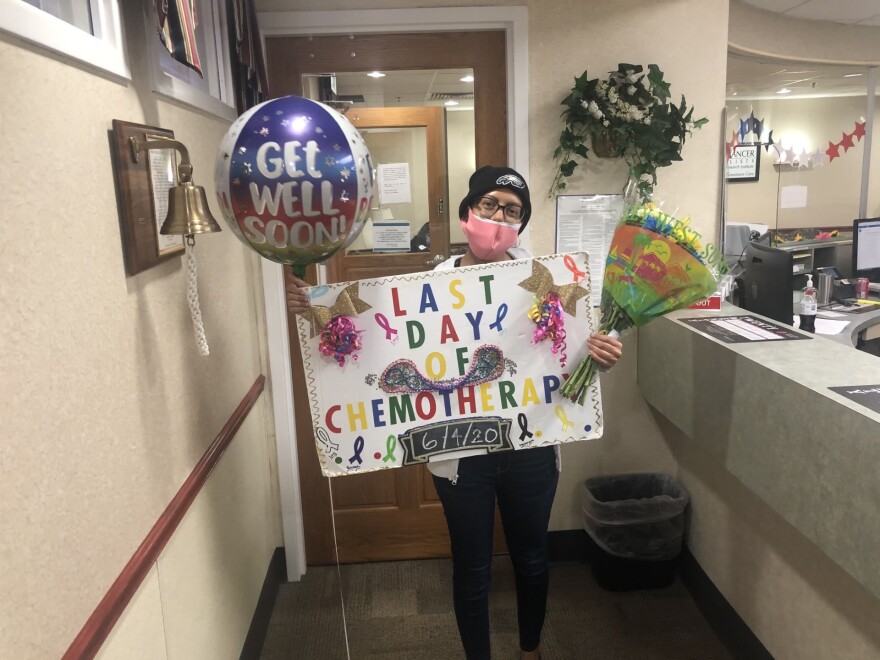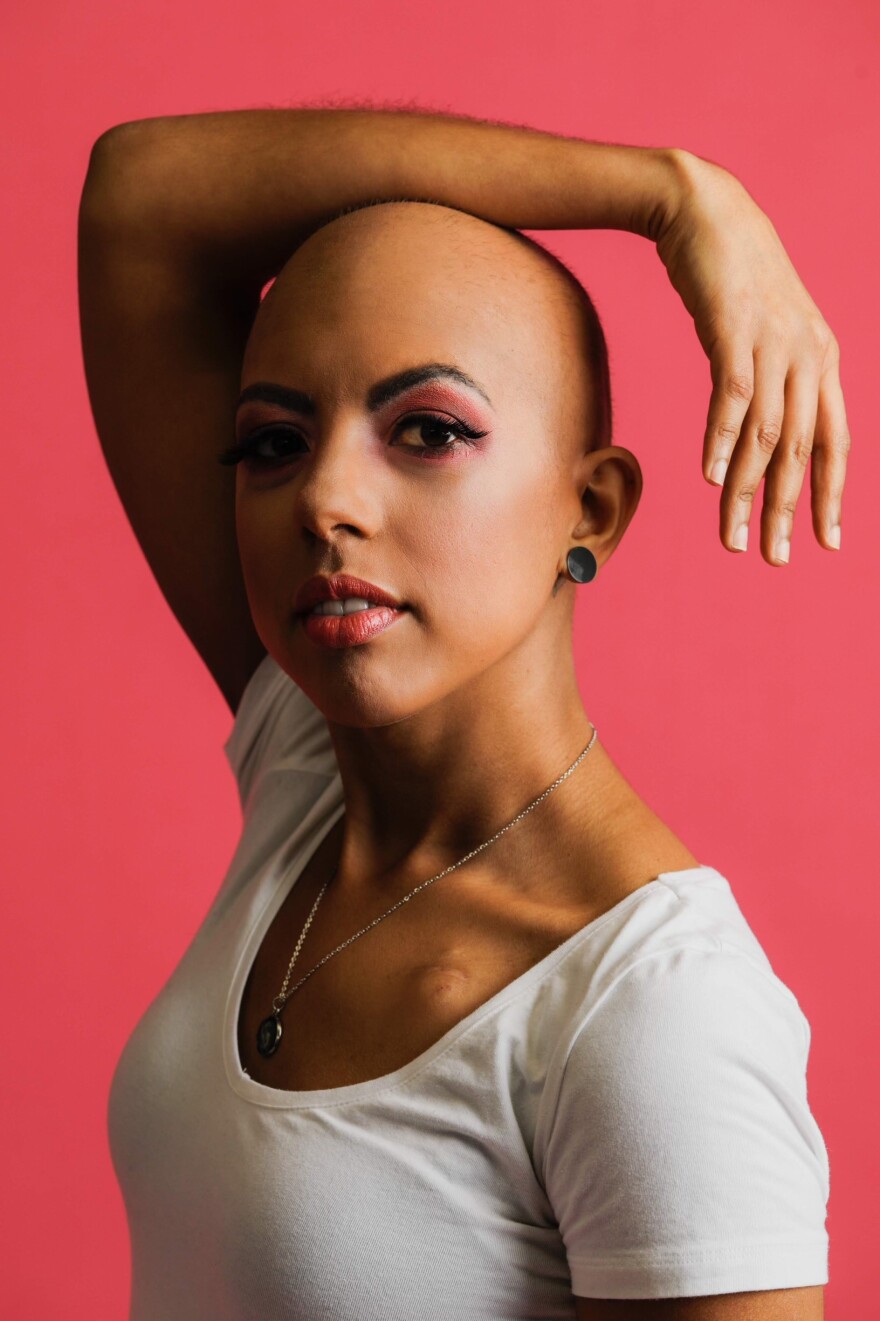Vanessa De La Rosa Martinez was 29 when she was first diagnosed with breast cancer. She had no family history. She did not smoke or drink excessively.
“It was surprising because I’m not there. I was basically living the average American life,” she said.
Martinez is just one example of a trend doctors are seeing: cancer diagnoses among younger women. A study published earlier this year by the JAMA Networkfound between 2010 and 2019, around 63% of cancer patients were women with early-onset cancer – with breast cancer being the most common diagnosis.
Younger patients
In 2019, Martinez first noticed a cyst. Its growth was abnormally rapid. She had a biopsy. It came back positive for stage 3 breast cancer.

Vanessa De La Rosa Martínez
/
AdventHealth
“I burst into tears,” she said. “My first thought was, oh my God, I’m going to do chemo, and I was very, very surprised and shocked, thinking about my hair loss and the image of chemotherapy.”
Martinez’s story is not uncommon according to Dr. Amber Orman, an oncologist at AdventHealth in Central Florida.
“My whole career has been focused on breast cancer, and the number of patients who are getting it, sometimes in their 20s and 30s, but certainly in their 30s and 40s, seems to be increasing,” said Dr. Amber Orman, oncologist at AdventHealth in Central. Florida. “When it became apparent that in the United States we were having an increase in cancer cases among people under 50, particularly an increase in women, with breast cancer being the most common cancer, I Wasn’t honestly surprised.”
Poor diet and a perfect cancer storm
The JAMA Network study did not reveal an answer as to why cancer is increasingly common in patients under 50 (50- to 70-year-olds are still one of the highest risk groups the highest), but she offered a possible explanation: poor diet and obesity.
“Two-thirds of our population is overweight or obese. And that’s a staggering number,” she said. “That, in itself, is a source of inflammation for the body.”
Obesity leads to inflammation in the body, which in turn leads to chronic diseases like cancer.
In Martinez’s case. She wasn’t obese, but she didn’t eat very healthy either.
“I would still eat a lot of processed foods. A lot of cheese, a lot of dairy, and a lot of things that could harm me hormone-wise,” she said.
Her breast cancer tested positive for hormones. Dr Orman said nutrition plays an important role in the development of cancer.
“While 5 to 10% of cancers have a genetic component. The rest has to do with a million things that have happened in your lifetime,” Orman said. And it has to do with your lifestyle as a whole.”
Nutrition, sleep, relationships and environmental exposures culminate in a perfect cancer storm, she said.
The HEAL program
Nutrition itself has been a favorite subject of Orman’s since she was a child living on a farm in Indiana. She delved into the subject in medical school, even though it wasn’t required reading. She still taught herself in order to improve the efficiency of her studies.
“I wanted to know how to optimize my performance in my studies and pursue medicine,” she said.
Today, in his oncology practice, Orman takes this optimization mentality and applies it to treatment. Orman combines the nutritional strategy with traditional treatments – radiation and chemotherapy – in a program she developed called HEAL – Healthy Eating and Active Lifestyle.
“We treat your cancer with radiotherapy, but how can we also optimize your lifestyle to really advance your outcomes beyond those of our traditional treatments? ” she says.

Vanessa De La Rosa Martínez
/
AdventHealth
HEAL is an eight-week interactive virtual program that helps patients focus on plant-based nutrition, yoga and mindfulness to improve their cancer treatment.
HEAL teaches patients about the body’s gut microbiome, a group of bacteria that assist the immune system. Orman explains to patients how a predominantly plant-based diet can help gut bacteria.
“This results in better functioning of your immune system and decreased overall inflammation in your body,” Orman said.
A plant-based diet can reduce the risk of cancer recurrence by 30 to 50 percent and the risk of death by 50 percent, according to Orman. THENational Library of Medicineand the American Society of Clinical Oncologyboth have studies with similar results. The HEAL program also teaches yoga, exercise, and how grief counseling releases supportive endorphins to improve the immune system.
Confidence after cancer
Martinez was one of the first graduates of Orman’s HEAL program. She made huge changes to her lifestyle, including incorporating a largely plant-based diet. Her favorite is a bowl of quinoa, spinach and kale.
“With bulgogi sauce and carrots and just a bunch of vegetables and it’s super cool, super delicious,” Martinez said.
It will be three years in November since Martinez completed radiation treatment, but she has been cancer-free since July 2020. Martinez feels healthier now than before her diagnosis and said she doesn’t live in fear of a possible return of his cancer.
“I’m confident that I’m doing everything I can to make sure that doesn’t happen,” she said.
Experts say women ages 50 to 74 should have a mammogram every one to two years. Women ages 40 to 49 should talk with their doctor about when to start mammograms.
Orman’s HEAL program is open to all cancer patients, not just those treated at AdventHealth. If you would like to find out more or register, you can contact HEAL on this link.
